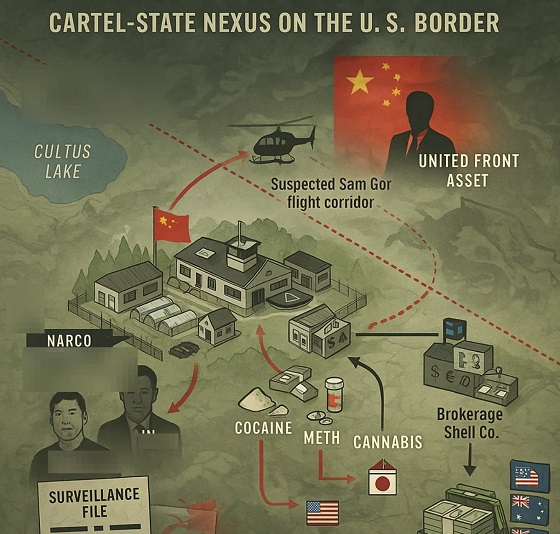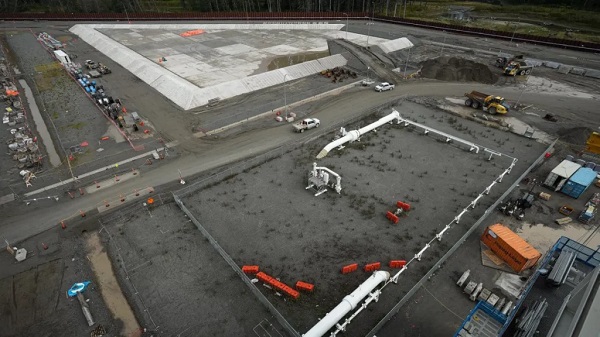International
FREE MARINE LE PEN!’: Trump defends French populist against ‘lawfare’ charges

From LifeSiteNews
‘The Witch Hunt against Marine Le Pen is another example of European Leftists using Lawfare to silence Free Speech, and censor their Political Opponent,’ Donald Trump on Truth Social.
U.S. President Donald Trump defended French populist Marine Le Pen as a fellow victim of “lawfare” after the popular opposition leader was barred from the 2027 French national election due to embezzlement charges.
“The Witch Hunt against Marine Le Pen is another example of European Leftists using Lawfare to silence Free Speech, and censor their Political Opponent, this time going so far as to put that Opponent in prison,” Trump wrote Thursday night on Truth Social.
As of Sunday, Le Pen, head of the National Rally (RN) party, was leading polls to win the presidential election, being 11 to 17 points ahead of the party of the globalist President Emmanuel Macron.
On Monday, Le Pen was hit with a five-year ban on running for elected office and sentenced to four years of prison on charges of “misuse of EU funds,” although two years were suspended and the remaining two would be served through house arrest.
Le Pen and her co-defendants were specifically accused of illegally using European Parliament funds for party employees who “seldom (or never) dealt with affairs in Brussels or Strasbourg,” of which the court held Le Pen personally responsible for €474,000.
Her prison sentence has been paused as her lawyer appeals the ruling, but the ban on her running for office nevertheless remains in force, despite the fact that legal penalties are typically delayed during the appeals process, according to Politico.
In his Truth Social post, Trump accused French leftists of using a “minor charge” against Le Pen as a pretext to block her from office.
“Just before what would be a Big Victory, they get her on a minor charge that she probably knew nothing about – Sounds like a ‘bookkeeping’ error to me,” wrote Trump.
“It is all so bad for France, and the Great French People, no matter what side they are on. FREE MARINE LE PEN!” he concluded.
Conservatives across Europe have rallied to Le Pen’s defense following Monday’s ruling, similarly slamming the decision as a pretext to exclude her from politics.
“I am Marine!” wrote Hungarian Prime Minister Viktor Orbán on X Monday, in a cry of solidarity with his fellow anti-globalist.
“This is nuts,” remarked former Greek finance minister Yanis Varoufakis on X. “Lawfare is wrong whomever it targets. And it is stupid to boot. France’s neofascists will only benefit from this, just as the MAGA lot did. A panicking illiberal establishment across the West is diving headlong into a totalitarian pit.”
“I am shocked by the incredible tough verdict against Marine Le Pen,” chimed in Geert Wilders, leader of a Dutch populist party that won a national election in 2023. “I support and believe in her for the full 100% and I trust she will win the appeal and become President of France.”
Russian President Vladimir Putin’s spokesperson Dmitry Peskov has called the ruling a “violation of democratic norms,” and Reform UK party leader Nigel Farage denounced Le Pen’s “cancellation” as based on “a very trumped-up charge.”
“In this country we have nine county council elections on 1 May that won’t happen, and may not happen for years,” said Farage, according to the BBC. “And in France, they cancelled a candidate. A candidate that would, without doubt, have won the next French presidential election. And you know what, if looks to me like a very trumped-up charge.”
“They will not succeed in silencing the voice of the French people,” said Santiago Abascal, head of the pro-family, right-wing Vox party in Spain.
Italy’s Deputy Prime Minister Matteo Salvini urged Le Pen to keep fighting, calling her verdict a “bad film” akin to political shut-outs occuring in other countries like Romania.
“We will not be intimidated, we will not stop: full speed ahead my friend,” said Salvini.
Business
Rogue Devices Capable Of Triggering Blackouts Reportedly Found In Chinese Solar Panels


From the Daily Caller News Foundation
By Audrey Streb
“That effectively means there is a built-in way to physically destroy the grid”
Officials are reportedly reassessing the risk posed by Chinese-made devices found in solar panels that are capable of damaging the energy infrastructure, destabilizing the power grid and triggering widespread blackouts.
Over the past nine months, “rogue communication devices” not listed in product documents were found in solar power inverters and batteries from several Chinese suppliers, according to sources familiar with the matter who spoke with Reuters. The undocumented devices were found after U.S. experts disassembled the renewable energy equipment to check for security issues, prompting officials to review the potential dangers of the Chinese-made devices, according to the publication.
“We know that China believes there is value in placing at least some elements of our core infrastructure at risk of destruction or disruption,” Mike Rogers, a former director of the U.S. National Security Agency, told Reuters. “I think that the Chinese are, in part, hoping that the widespread use of inverters limits the options that the West has to deal with the security issue.”
Dear Readers:
As a nonprofit, we are dependent on the generosity of our readers.
Please consider making a small donation of any amount here.
Thank you!
The communication devices were reportedly found in power inverters, which are used to connect solar panels and wind turbines to the power grid and are often produced in China. They are also found in electric vehicle chargers, batteries and heat pumps. Undocumented cellular radios were also found in Chinese-manufactured batteries, according to the publication.
If the rogue communication devices found in the inverters are used to circumnavigate firewalls and change the settings or turn off inverters remotely, this could destabilize power grids, damage energy technology and prompt blackouts, according to experts who spoke with Reuters.
“That effectively means there is a built-in way to physically destroy the grid,” one of the sources told the publication.
For years, energy and security experts have cautioned that reliance on Chinese products for green energy could expose the U.S. to espionage and security risks.
A spokesperson for the Department of Energy (DOE) told Reuters that it continually evaluates risks involving new technology and that “while this functionality may not have malicious intent, it is critical for those procuring to have a full understanding of the capabilities of the products received.”
“We oppose the generalisation [sic] of the concept of national security, distorting and smearing China’s infrastructure achievements,” a spokesperson for the Chinese embassy in Washington told Reuters.
Republican officials sent a letter advising an American energy company to stop using Chinese-manufactured batteries due to the security risks in December 2023, according to a February 2024 statement.
“We approached Duke Energy regarding its use of Chinese-manufactured CATL batteries and network-equipped systems, which posed an unacceptable surveillance risk at Camp Lejeune, North Carolina — the largest Marine Base in the United States. Directly following our inquiry, Duke disconnected the Chinese-manufactured systems from the grid,” former Republican Wisconsin Rep. Mike Gallagher and Secretary of State Marco Rubio, a U.S. senator for the state of Florida at the time, wrote in the press release. “Others that continue to work with CATL, and other companies under the control of the CCP, should take note,” they continued.
conflict
Inspired by Ukraine, Armed by the U.S., Reinvented by Tech: Taiwan’s New Way of War

 Sam Cooper
Sam Cooper
HIMARS Test Marks Taiwan’s Move to Jungle-Hardened, Tech-Backed Defense Doctrine
The HIMARS roar that echoed off the coastal mountains of southern Taiwan this week was more than a weapons test. It was a declaration of deterrence.
From their perch at Jiupeng military base—where steep green ridges descend toward the Pacific—Taiwanese forces fired the U.S.-made rocket artillery system in a live-fire display designed to show how the island is transforming itself into a fortress of modern asymmetric warfare. The Taiwanese unit conducting the test had trained with U.S. forces in Oklahoma in 2024, and this week’s exercise marked the first time they demonstrated their proficiency with HIMARS on home soil.
The HIMARS platform—demonstrated in footage provided to The Bureau from Taiwan Plus—signals a decisive shift toward a mobile, nimble defensive force designed to face overwhelming scale. Unlike fixed missile sites or air bases—prime targets expected to be destroyed within hours of a PLA first-wave assault—truck-mounted HIMARS units can slip into position, launch a strike, and quickly vanish into Taiwan’s jungle-thick terrain and cliffside roads. These launchers are meant to hide, hit, and move—relying on camouflage, speed, and the natural topography of the island to stay alive and strike again.
This transformation had been quietly underway for years. In September 2023, The Bureau met with Taiwanese military strategists and international journalists at a closed-door roundtable in Taipei. Among them was a Ukrainian defense consultant—invited to share hard-won battlefield lessons from Kyiv’s resistance. The strategist told the group that the most crucial lesson for Taiwan was psychological: to instill in citizens and soldiers alike the will to prepare for aggression that seems impossible and illogical, before it arrives. “You must believe the worst can happen,” the Ukraine vet said.
That same week in Taipei, Taiwan’s then-Foreign Minister Joseph Wu made the case directly in an interview:
“There’s a growing consensus among the key analysts in the United States and also in Taiwan that war is not inevitable and the war is not imminent,” Wu said. “And we have been making significant investment in our own defense—not just increasing our military budget, but also engaging serious military reforms, in the sense of asymmetric strategy and asymmetric capability.”
That principle now guides Taiwan’s evolving force posture. The May 12 HIMARS test—launching precision-guided rockets into a Pacific exclusion zone—was the first public demonstration of the mobile artillery system since the U.S. delivered the first batch in late 2024. With a range of 300 kilometers, HIMARS provides not only mobility but standoff power, allowing Taiwan’s forces to strike amphibious staging areas, beachheads, and ships from hardened inland positions. Lockheed Martin engineers observed the drills, which were broadcast across Taiwanese news networks as both a military signal and psychological campaign.
The live-fire exercise also marked the debut of the Land Sword II, a domestically developed surface-to-air missile system designed to counter diverse aerial threats, including cruise missiles, aircraft, and drones. Land Sword II adds a mobile, all-weather air defense layer to Taiwan’s increasingly dense multi-domain network. By deploying it alongside HIMARS, Taiwan demonstrated its commitment to building overlapping shields—striking at invading forces while protecting its launch platforms from aerial suppression.
But these new missile systems are only the tip of the spear.
Taiwan’s military has quietly abandoned the vestiges of a Cold War posture centered on fleet battles and long-range missile parity with the mainland. Defense officials now concede that attempts to match Beijing plane-for-plane or ship-for-ship are a dead end. Instead, inspired by the “porcupine” concept outlined by retired U.S. Marines and intelligence officials, Taiwan is remaking itself into a smart, lethal archipelago fortress—one where unmanned drones, dispersed missile cells, and underground fiber-linked command posts neutralize China’s numerical advantage.
Wu, who now serves as Secretary-General of Taiwan’s National Security Council, has been one of the doctrine’s most consistent advocates. In his writings and interviews, Wu points to Ukraine’s ability to hold off a vastly superior invader through mobility, deception, and smart munitions. “We are not seeking parity. We are seeking survivability,” he wrote in Foreign Affairs. “And if we survive, we win.”
A New Arsenal of Ideas: From Silicon Valley to the Taiwan Strait
If Ukraine showed the value of agile, off-the-shelf technologies on the battlefield, Taiwan seems poised to go a step further—by integrating cutting-edge systems developed not by defense contractors, but by Silicon Valley insurgents.
Among the most closely watched innovators is Palmer Luckey, the former Oculus founder whose defense firm, Anduril Industries, is quietly revolutionizing battlefield autonomy. Through its Dive Technologies division and flagship Ghost and Bolt drone platforms, Anduril builds AI-guided aerial and underwater drones capable of swarming enemy ships, submarines, and even mines—exactly the kinds of systems Taiwan could deploy along its maritime approaches and chokepoints.
Luckey, who visited Japan and South Korea in early 2025 to brief U.S. allies on asymmetric AI warfare, has warned that in a Taiwan invasion scenario, the side with better autonomous targeting and tracking could determine victory before a single human-fired missile is launched.
“The PLA is betting big on AI,” he told Business Insider. “If Taiwan and the U.S. don’t match that, we’re done.”
Much of this strategy finds intellectual backing in The Boiling Moat, a 2024 strategy volume edited by former U.S. National Security Advisor Matt Pottinger. The book proposes a multi-layered defense of Taiwan that includes hardened ground troops, swarming drones, portable anti-ship missiles, and AI battlefield networking.
Pottinger argues that Taiwan must become “the toughest target on earth”—a phrase now common among Taiwanese officers briefing American delegations. Speaking to NPR last year, Pottinger noted that Taiwan’s survival doesn’t rest on matching China’s power, but on “convincing Beijing that the price of conquest will be far too high to bear.”
The Bureau is a reader-supported publication.
To receive new posts and support my work, consider becoming a free or paid subscriber.
Invite your friends and earn rewards
-

 espionage2 days ago
espionage2 days agoOttawa Raises Alarm With Beijing Over Hong Kong Detention of CPC Candidate Joe Tay’s Family
-

 Health2 days ago
Health2 days agoRFK Jr. Says Trump Just Did What No Democrat Ever Had the Guts to Do
-

 Business1 day ago
Business1 day agoWashington Got the Better of Elon Musk
-

 Crime2 days ago
Crime2 days agoU.S. Charges Sinaloa Cartel Leaders With Narco-Terrorism After Record Fentanyl Seizure
-

 Addictions1 day ago
Addictions1 day agoWhy the U.S. Shouldn’t Copy Canada’s Experiment with Free Drugs
-

 Agriculture2 days ago
Agriculture2 days agoCanada Greenlights Mass Culling of 400 Research Ostriches Despite Full Recovery from Bird Flu Months Ago
-

 conflict1 day ago
conflict1 day agoInspired by Ukraine, Armed by the U.S., Reinvented by Tech: Taiwan’s New Way of War
-

 MxM News1 day ago
MxM News1 day agoInvestigating Biden’s last minute pardons






